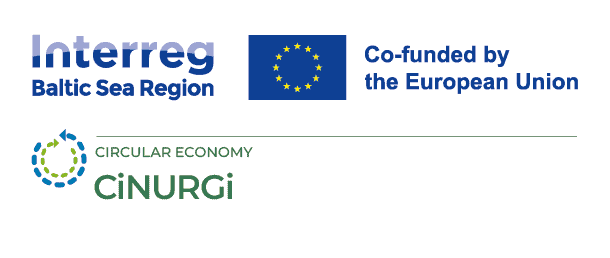ESNI-NERM 2026 Conference
Project: CiNURGi
Virtual Meeting & Physical Meeting
28. - 29. April 2026
12:00 - 17:00 (CET)

We’re happy to share the latest CiNURGi newsletter with you! It’s packed with highlights and updates about what’s been happening in the project.
Take a moment to explore the newsletter and learn more about CiNURGi’s achievements, activities, and what’s coming next. We’d love to have you along for the journey!
Read the Newsletter here.
In the heart of the Baltic Sea Region, farmers Hanna and Hugo have long relied on chemical fertilizers to nourish their crops. These fertilizers, often imported and energy-intensive to produce, have contributed to environmental challenges, including nutrient runoff leading to eutrophication in local waterways.
Simultaneously, vast amounts of organic waste—manure from farms, sewage sludge from municipal treatment plants, and biowaste from households—accumulate, rich in nutrients yet underutilized. Transporting this bulky waste to fields is logistically challenging, and its composition is often not well understood, leading to undesired risks.
The linear approach to nutrient use—extract, apply, discard—has proven unsustainable. Phosphorus, a finite resource, is mined predominantly outside the EU, raising concerns about long-term availability. Nitrogen production is energy-intensive, relying heavily on fossil fuels. The overapplication of these nutrients in agriculture leads to runoff into waterways, causing eutrophication that depletes oxygen in water bodies, harming aquatic life and disrupting ecosystems.
CiNURGi envisions a future where nutrient-rich waste streams are transformed into valuable resources, closing the loop in nutrient cycles. By focusing on agricultural, municipal, and industrial biomass, the project aims to:
Assess Nutrient Recycling Potential: Evaluate the quantity and spatial distribution of recyclable biomasses to identify regions with nutrient surpluses or deficits.
Develop Quality Assurance Standards: Formulate comprehensive assessment schemes to ensure the safety and efficacy of recycled nutrient fertilizers (RNFs), focusing on agronomic efficiency, economic viability, and environmental safety.
Pilot Innovative Solutions: Test and evaluate new technologies for nutrient recycling, such as producing biochar-based fertilizers from materials like ash, digestate, and sewage sludge.
Engage Stakeholders: Collaborate with farmers, policymakers, and industry stakeholders through webinars and conferences to disseminate findings, share best practices, and promote the adoption of recycled fertilizers.
CiNURGi's initiatives include:
CiNURGi engages in regional policy dialogue to enhance nutrient recycling by integrating project findings into the Baltic Sea Action Plan and the HELCOM Baltic Sea Regional Nutrient Recycling Strategy. This is achieved through local, regional, and EU-level events and interactions, as well as digital communication channels like the project's website and LinkedIn.
By integrating these approaches, CiNURGi supports the implementation of the Baltic Sea Regional Nutrient Recycling Strategy. The project aims to:
Through cross-sector collaboration and innovative solutions, CiNURGi contributes to reducing nutrient losses, lessening reliance on imported mineral fertilizers, and mitigating environmental impacts like eutrophication. This paves the way for a more sustainable and resilient agricultural system in the Baltic Sea Region.
In the future, when farmers like Hanna and Hugo decide how to fertilize their fields, they can opt for safe, affordable recycled fertilizers that don't necessitate extensive distribution infrastructure. They know that their choice is sustainable, enhancing supply security, reducing dependence on fossil fuels and imported mineral fertilizers, and bolstering the rural economy and employment opportunities. Moreover, they can be confident that farmers across the Baltic Sea Region operate on a level playing field, with consistent environmental regulations and economic incentives promoting the adoption of recycled nutrients.
Project: CiNURGi
Virtual Meeting
11. December 2025
11:00 - 15:00 (CET)
Project: CiNURGi
Virtual Meeting
19. November 2025
13:00 - 14:30 (CET)
Project: CiNURGi
Physical Meeting
29. - 30. October 2025
Project: CiNURGi
Virtual Meeting & Physical Meeting
27. August 2025
13:30 - 14:15 (EET)
Project: CiNURGi
Virtual Meeting
09. June 2025
13:00 - 16:00 (EET)
Project: CiNURGi
Physical Meeting
20. May 2025
11:45 - 15:30 (CET)
Project: CiNURGi
Virtual Meeting & Physical Meeting
12. May 2025
11:30 - 19:10 (EET)
Project: CiNURGi
Virtual Meeting
18. November 2024
13:00 - 15:00 (EET)
Interactive map showing pilot locations. Use the arrow keys to move the map view and the zoom controls to zoom in or out. Press the Tab key to navigate between markers. Press Enter or click a marker to view pilot project details.